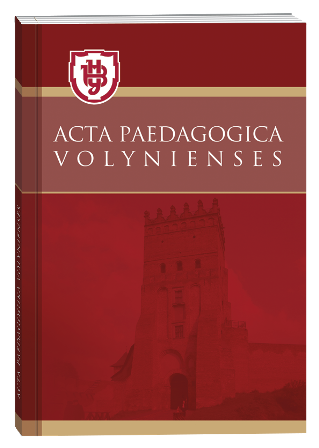ACTUALITY OF FORMS AND METHODS OF MONTESSORI’S SOCIAL EDUCATION IN THE PEDAGOGICAL PROCESS OF THE NEW UKRAINIAN SCHOOL
DOI:
https://doi.org/10.32782/apv/2022.1.2.19Keywords:
social education, Montessori concept, principle of free choice of activity, technology “House of a free child”, social and health-preserving branches of NUSAbstract
The purpose of the study is to substantiate the relevance of forms and methods of social education M. Montessori and determine the feasibility of their use in the pedagogical process of the New Ukrainian school. In the process of revealing the topic, such research methods as analysis, synthesis, comparison, systematization, generalization were used. The social orientation of M. Montessori’s pedagogical concept, the essence of which is education through the practice of life, is revealed. The article highlights the research hypothesis, which can be considered the formula for successful pedagogical activity: education should not be limited to the development of intelligence, and the acquisition of knowledge should be complemented by enrichment of social experience and development of moral qualities and beliefs. The identification of M. Montessori's authorial model of education with the philosophy of individualism has been denied by some experts. Instead, the conceptual goal was confirmed – the formation of the ability to live in society, which echoes the modern programs “Learning to Live Together”, “Culture of Good Neighborliness” and others. Some conceptual provisions of the technology “House of a free child” are characterized, which should be implemented in the pedagogical process of primary school, in particular: the principles of discipline through freedom of action and free choice of activities; method of artificially created educational situations; non-traditional forms of gradual adaptation to the requirements of society and the formation of collectivist qualities – for the implementation of the social sphere; forms of space education – for the health industry. Conclusions on the liberation of certain pedagogical ideas of M. Montessori from the existing biased stereotypes and expert assessments are formulated.
References
Волошин А.І. Педагогічні твори ; упорядкування та передмова М.І. Кляп ; підготовка текстів та примітки Д.М. Федаки. Ужгород : ВАТ «Видавництво «Закарпаття», 2007. 576 с.
Дичківська І.М., Поніманська Т.І. М. Монтессорі: теорія і технологія. Київ : Видавничий Дім «Слово», 2009. 304 с.
Дичківська І.М. «Будинок вільної дитини». М. Монтессорі. Інноваційні педагогічні технології : навчальний посібник. Київ : Академвидав, 2004. С. 79–101.
Монтессори М. Дети ‒ другие: Статьи, советы и рекомендации / перевод Я. Нефедова. Москва : Карапуз, 2004. 336 с.
Монтессорі М. Метод наукової педагогіки, застосовуваний до дитячого виховання в «Будинках дитини». Історія зарубіжної педагогіки : хрестоматія / Є.І., Коваленко, Н.І. Бєлкіна. Київ : Центр навчальної літератури, 2006. С. 520–537.
Монтессори М. Через ребенка – к новому миру. Социальное и нравственное воспитание. URL: http://montessori.Ru/montessori/publication/to_a_new_world.php (дата звернення: 15.11.2021).
Про Марію Монтессорі. URL: https://montessori.ua/uk/pro-mariju-montessori/(дата звернення: 10.10.2021).
Поніманська Т.І. Зарубіжні педагогічні концепції дошкільної освіти ХХ ст. Дошкільна педагогіка : навчальний посібник. Київ : Академвидав, 2006. С. 108.
Русова С. З маловідомого і невідомого ; упорядники О. Джус, З. Нагачевська. Івано-Франківськ : Гостинець, 2006. Частина 1: «Несторка української педагогічної літератури». 456 с.







